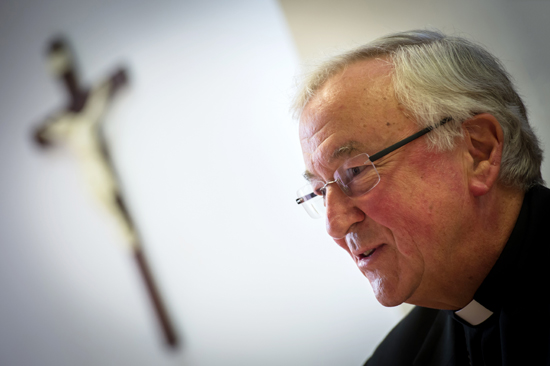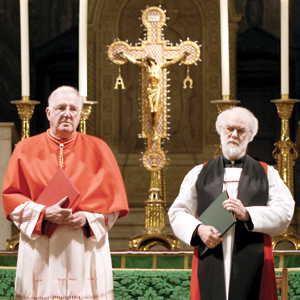Rowan Williams recalls a professional and personal relationship forged over more than four decades of ecumenical endeavour..
I first met Cormac when I was chaplain at Westcott House in Cambridge and he was Rector at the English College, with which at that time Westcott had a flourishing and much appreciated exchange scheme. The scheme itself was a sort of testimony to the optimistic climate of the 1970s in Anglican-Roman Catholic relations: it assumed, for practical purposes, that our two institutions were training people for a ministry that was basically very much the same. The statements by the Anglican-Roman Catholic International Commission (Arcic) on eucharistic theology and ordained ministry had, it seemed, set out the parameters of a pretty substantial area of convergence, and, though no one knew quite where this was going and everyone accepted that there were some hills still to scale, it was a profoundly positive time.
Cormac’s own long involvement with Arcic reflected his deep loyalty to the hopes of that era. I don’t think he ever looked back, and whenever we discussed ecumenical issues, that was the territory he took for granted – hence the often repeated comment that the ecumenical process was a motorway where you didn’t make U-turns. In practice, during my time at Canterbury, this meant a very high level of just doing things together – trying to co-ordinate comments on public affairs, from the Iraq war to domestic tensions, visiting each other regularly (happy memories of Cormac eating sausages and beans or whatever with my family in the flat at Lambeth, as well as the more public occasions), the unforgettable pilgrimage to the Holy Land with the other Presidents of Churches Together in England.
And, of course, the immense privilege of accompanying Cormac to visit two successive Popes: another vivid memory of a lively multilingual lunch in the Apostolic Palace with Pope Benedict on my first official visit to him, with Cormac in fine anecdotal flow. The joint days of prayer and discussion between Anglican and Roman Catholic bishops, which we organised regularly, were a visible sign of what we both most wanted, a genuine sharing of apostolic ministry in this country, even if we could not find our way to the fullest sign of sacramental sharing.
Underneath Cormac’s unceasing geniality and the sometimes chaotic way in which he could conduct meetings was – as all who knew him well would agree, I think – both a formidable shrewdness of judgement (not shrinking from sharpness where he thought it needful) and a fundamental spiritual confidence. He was modest, far too much so, about his theological abilities, but his theological instincts were strong and well informed. He could hardly have contributed as he did to Arcic over all those years, and held his own, without such a hinterland.
His cast of mind wasn’t speculative, and he could be gently mocking of those who were more likely to yield to this temptation. (I seem to recall a passage in his memoir, An English Spring, where he notes the present writer’s capacity to see three sides of every question.) But he couldn’t be called anti-intellectual. And, although he naturally defended the magisterium on a variety of moral questions, he never appeared as a partisan or “tribally” Catholic figure, but as someone who believed that the Christian witness we needed in Britain was never going to be the preserve of just one ecclesial body. His ecumenism was always in that sense oriented towards mission.
The episcopal ring that I now wear was Cormac’s; he presented me with it at the dinner we held in Church House to mark his retirement. I was deeply moved by this gesture of a loving and fraternal relationship, and it means that I shall always have a daily remembrance of him. For myself and my family, he was a joyful, enlivening presence, a genuinely loved friend, and a brother in priestly and episcopal ministry. I give thanks to God for the delight of working with him and learning from him.
Rowan Williams (Lord Williams of Oystermouth) was the Archbishop of Canterbury from 2002 to 2012.



 Loading ...
Loading ...